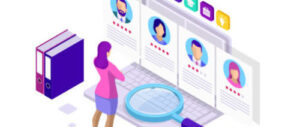-
Provided by

- Date published: Feb 7, 2023
- Categories
With estimates that the metaverse will become a five trillion dollar industry by 2030, there are likely to be few aspects of corporate life that are unaffected. The metaverse can assist in addressing prevalent issues such as a shortage of talent, a need for ongoing skill development, promoting diversity, equity, and inclusion, and implementing new societal agreements.
It is in training and education that the potential is arguably greatest, however, with the metaverse able to serve as a platform for simulated training with low risk and cost, preparing individuals for real-life situations. This is certainly the case in the hospitality sector, where investment in the metaverse is predicted to grow by 25% year on year.
“Integrating virtual reality technology in education can enable learners to engage in immersive and realistic simulations that closely mimic real-world situations and challenges, thus facilitating the transition from theoretical knowledge to practical skills,” explains Dr Lohyd Terrier, Associate Professor at EHL Hospitality Business School, which is regarded as the best hospitality school in the world.
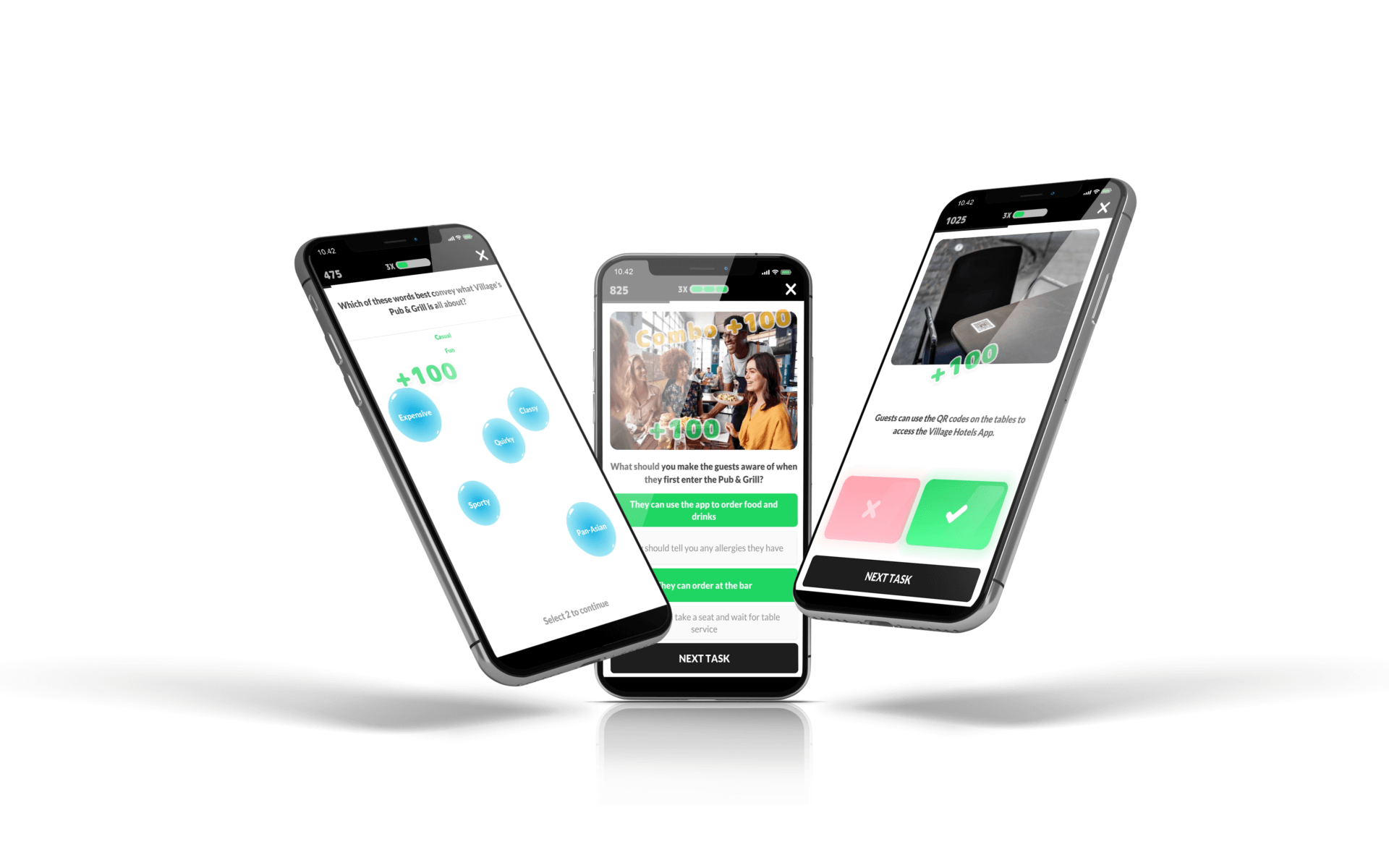
Filling the skills gap
This investment in technology to help develop staff was evident at Village Hotels, which like much of the hospitality sector was facing a skills shortage. Indeed, industry data suggests that 700,000 hospitality workers were leaving the sector each month, which created twin pressures of both retention and also ensuring inexperienced new recruits are able to get up to speed as quickly as possible.
“With Brexit and Covid so many people left the industry and so we really had to change the way that we recruit,” Lindsay Southward, HR director at Village Hotels, explains. “We had to develop an approach that helps someone who has potentially very little hospitality experience very quickly understand the job and what’s expected of them.”
The journey began in 2006 when the company embarked upon a project called Village Excellence, which aimed to move away from traditional standard operating procedures (SOP) with huge quantities of paperwork detailing standards, policies, and procedures. The project was in the right direction and it began to capture the culture of the business and identified the gap emerging between what was in the SOP and the reality on the ground. The program started to show employees not only what, but how and why.
While this project evolved and improved, it remained a very traditional kind of program that employees would work through but had become a culture and platform in the business but needed a more intuitive approach to gain traction in the new world of hospitality that was emerging to bring it to life.
The brand operates Starbucks franchises across most of its 33 UK hotels, which had already started a journey of immersive training.
“We looked at what Starbucks was doing to really drive the brand standards and identity that they’re so renowned for globally, and we discovered that they had started using gamification to really engage employees in learning and development,” Southward explains.
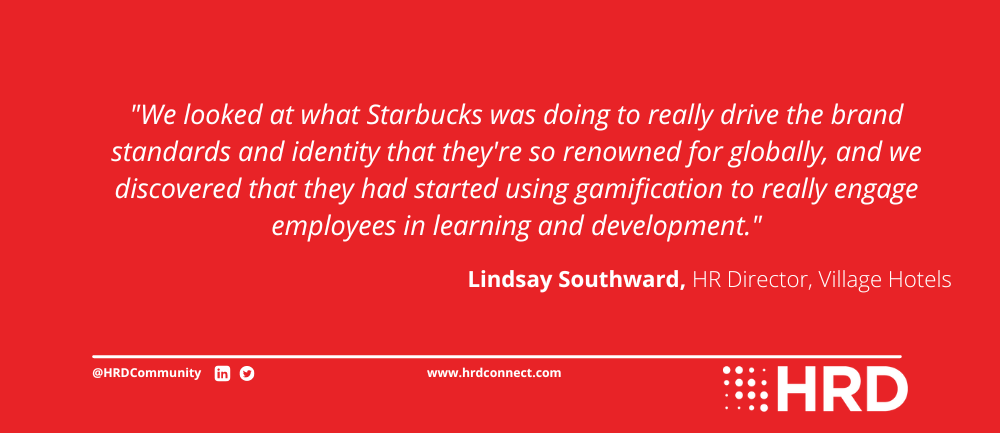
Incentivizing learning
Starbucks was utilizing a platform called Attensi, which provides a mobile-based platform that taps into the fun aspects of gaming technology to help participants learn. The platform was deemed to be ideal to enable the company to modernize the Village Excellence program and better engage the workforce which is the company’s future.
The company began by going back to basics and understanding where guest satisfaction scores were high and where they lagged behind. They also tapped into their Global Review Index, which is a benchmark used to compare results between hotels and track the performance of hotels over time.
They then took the existing excellence program and transformed it into a series of modular games that were all designed to be as engaging as possible while also delivering excellent learning outcomes.
Bespoke solutions
The relationship with Attensi was crucial to the success of the project, with the tech company visiting the hotels, they stayed overnight and ate in the restaurants. They physically lived through each of the journeys they were being asked to develop games for so that they could be as realistic and useful as possible.
“We took them through each of the journeys so they could really understand the touch points and how we can really bring the customer journey and the brand standards to life through the different games,” Southward says. “They really took time to understand the brand, our objectives, and what we’re trying to achieve.”
This was important as the platform was designed not just to be an online training tool but to be a key part of the culture and identity of the business. This co-creation approach also ensures that the platform is scalable as Village Hotels and Attensi work together so well.
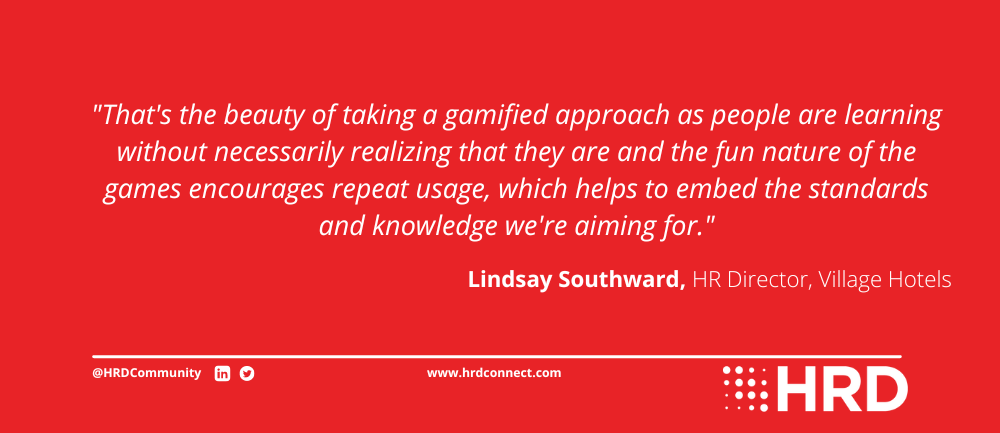
Impacting all areas of the business
The ambitious nature of the project means that the team are not just looking at traditional training metrics but also HR metrics, such as turnover, retention, and engagement. Indeed, the project also encapsulated various commercial metrics as well, with the thinking being that when employees were better able to do their job, this would feed through into higher customer satisfaction and ultimately profitability.
The gamification aspect of the platform was hugely important for engagement, as employees would often go the extra mile to improve their scores, even if they were already scoring highly on the task at hand.
“We have employees who even if they managed to score 90% on a particular task were going back to try and get to 92% or 93% in order to climb up the leaderboard,” Southward explains. “That’s the beauty of taking a gamified approach as people are learning without necessarily realizing that they are and the fun nature of the games encourages repeat usage, which helps to embed the standards and knowledge we’re aiming for.”
This level of engagement was especially valuable in the case of housekeeping, as the staff shortages across the hospitality sector meant that many people were recruited who had never worked in housekeeping before. It was invaluable to deploy an engaging tool that helps new recruits quickly understand what is expected of them and what the job requires. In many ways, this has been the area that has produced the biggest returns for the project.
Significant improvements
The introduction of the platform has produced significant results in a very short space of time, with a 9% improvement in the company’s engagement score, with many employees reporting that they felt like they had the tools and the knowledge required to do a good job.
There was also positive movement in the Guest Satisfaction Score (GSS), with one hotel that had achieved a 100% completion rate of the program among employees managing to grow their satisfaction rate from 7.4 to 8.3 in just three months.
“It was great to see that we were able to produce a direct correlation between the introduction of the program into a department and then the corresponding shift in guest satisfaction,” Southward says. “So we can really see that it’s working from an employee point of view as they enjoy using it, they talk about it, and this translates into a positive impact on the customer.”
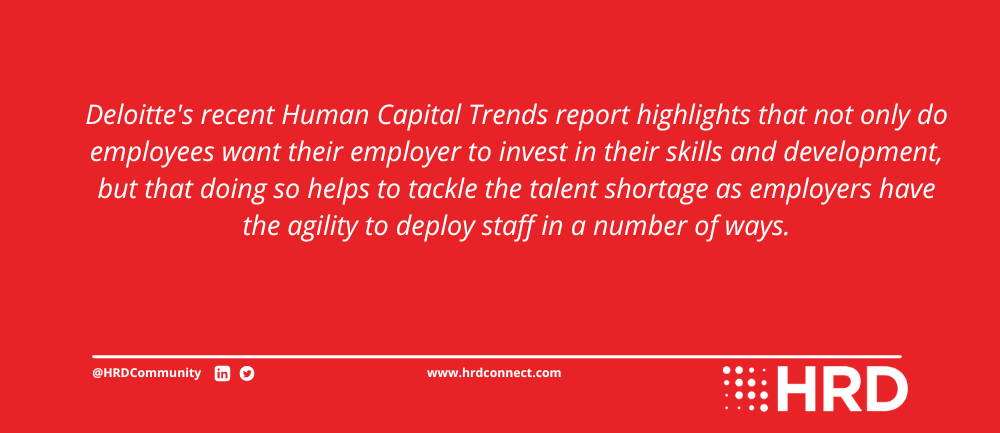
Scaling up
New modules for the platform take approximately 6-8 weeks to develop so the potential to scale it up rapidly is considerable, while the platform also comes with the capability for internal champions to create content themselves as their working environment evolves.
“For example, with our Pub &Grill, we can change the way our tables are set up or other brand standards, with our team able to go in and edit and upload new videos and content themselves, so the solution and games are always up to date” Southward explains.
This process has been made as easy as possible to take into account not only the busy nature of the brand but the fast and energetic pace it works at. This meant appointing internally trained system champions throughout the project to make it as straightforward as possible to keep the platform relevant and current.
The skills shortage across the hospitality sector has been unprecedented. While many firms have responded by raising wages to attract staff, this is unlikely to be enough in such a tight labor market. Indeed, Glassdoor economist Daniel Zhao recently expressed concern that the skills shortage could be present for years to come. As a result, offering the opportunity to develop one’s skills is likely to play a crucial role in both attracting new people to the industry and developing those already in it.
Deloitte’s recent Human Capital Trends report highlights that not only do employees want their employer to invest in their skills and development, but that doing so helps to tackle the talent shortage as employers have the agility to deploy staff in a number of ways.
“We think it’s so important to train people not only so they can do their current role to the best of their ability but also to allow them to grow their careers with us,” Southward concludes. “We really believe that our next leaders are here within our business and the workforce is full of people who have progressed up in the business by virtue of excelling at what they do. The partnership with Attensi has been a crucial part of that process.”



